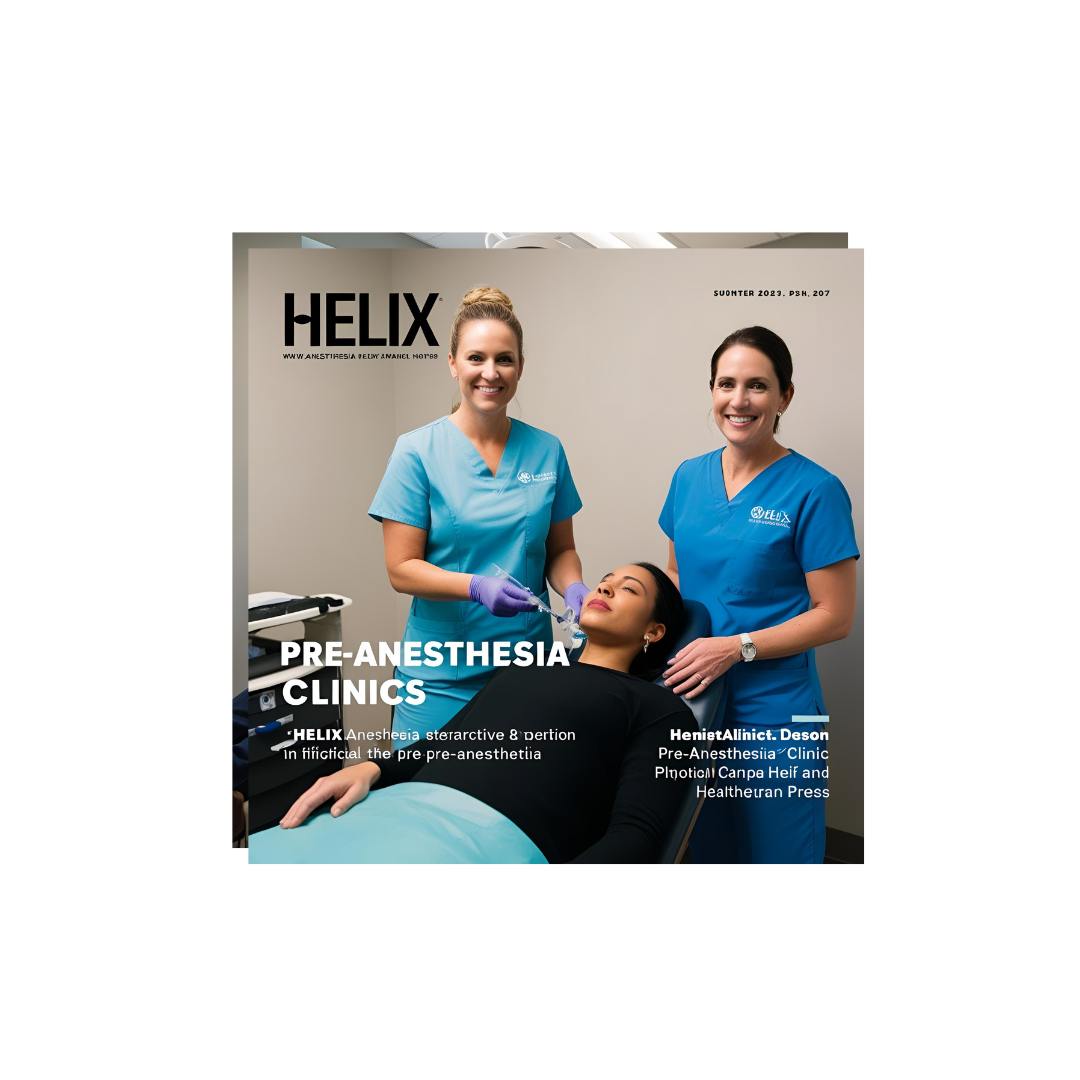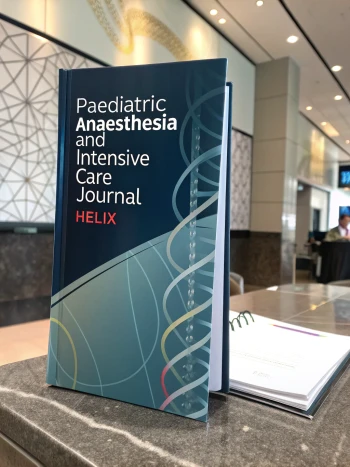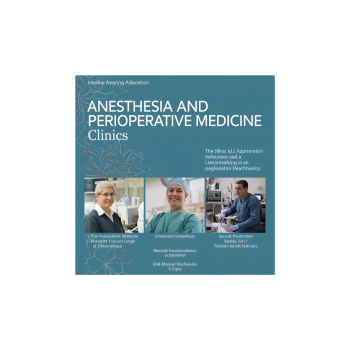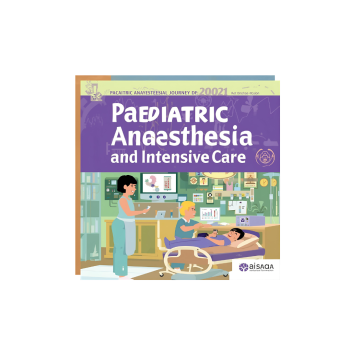Pre-Anesthesia Clinics-Helix is a publication of Helix Health Science www.helixhealthscience.com contact@helixhealthscience.com
Understanding Pre-Anesthesia Clinics: A Comprehensive Guide
What Are Pre-Anesthesia Clinics?
Pre-anesthesia clinics play a critical role in the healthcare system by providing a dedicated environment for the comprehensive assessment of patients who are scheduled to undergo surgery. These specialized clinics focus on evaluating the medical history, physical condition, and specific anesthesia needs of patients before their surgical procedures. The primary goal is to ensure patient safety and optimal outcomes during anesthesia administration.
Typically, patients visiting a pre-anesthesia clinic will undergo a rigorous assessment process. This includes a thorough review of their medical history, allergies, current medications, and any previous reactions to anesthesia. Additionally, healthcare professionals may conduct a physical examination and, if necessary, request lab tests or imaging studies to gather comprehensive information regarding the patient's health status. This information is essential for anesthesiologists to develop a tailored anesthesia plan that accommodates individual patient needs and reduces any potential risks.
The role of anesthesiologists in pre-anesthesia clinics extends beyond just assessing patients; they are responsible for educating patients about the anesthesia process. This includes explaining the types of anesthesia available, discussing potential risks, and addressing any questions or concerns that patients may have. By fostering an environment of open communication, anesthesiologists can help alleviate patient anxiety and promote a sense of confidence heading into surgery.
Furthermore, pre-anesthesia clinics contribute significantly to the overall efficiency of the surgical process. By thoroughly preparing patients ahead of time, these clinics help reduce last-minute cancellations and delays on the day of surgery, thereby enhancing operational flow in the surgical suite. Ultimately, the establishment of pre-anesthesia clinics underscores their important role in advancing patient safety, improving surgical outcomes, and ensuring a seamless healthcare experience.
The Importance of Pre-Anesthesia Assessments
The significance of thorough pre-anesthesia assessments in pre-anesthesia clinics cannot be overstated. These assessments serve as a critical component in ensuring patient safety and optimizing outcomes during surgical procedures. A comprehensive evaluation is conducted to identify potential risks associated with anesthesia, which can vary significantly from one patient to another.
During these evaluations, medical professionals review detailed patient histories, focusing on previous surgeries, chronic health conditions, and any known allergies. This initial step is essential as it lays the groundwork for understanding an individual's unique health profile. In addition to reviewing medical history, the pre-anesthesia clinic conducts various physical examinations. These may include assessments of vital signs, evaluation of airway anatomy, and cardiopulmonary function tests. Such evaluations are instrumental in identifying underlying health issues that might complicate anesthesia administration.
Moreover, specific laboratory tests such as blood work, electrocardiograms, or imaging might be necessary based on the patient's age, medical condition, or the nature of the planned surgery. These tests provide invaluable data that can reveal potential risks such as clotting disorders, heart abnormalities, or other conditions that could increase the chance of adverse reactions during anesthesia.
The insights gained from these thorough pre-anesthesia assessments enable anesthesiologists to develop individualized anesthesia plans. By tailoring the approach to each patient's specific health status and surgical needs, the likelihood of complications is significantly minimized. Ultimately, these evaluations not only enhance patient safety but also improve the efficacy of anesthesia management, leading to more favorable surgical outcomes. Therefore, the emphasis on pre-anesthesia assessments reflects the commitment to safe and individualized patient care in contemporary medical practice.
The Role of Helix Health Science in Pre-Anesthesia Clinics
Pre-Anesthesia Clinics-Helix from Helix Health Science has established itself as a leader in the provision of innovative solutions tailored for the pre-anesthesia clinic environment. Their comprehensive approach emphasizes patient care, safety, and the implementation of advanced technologies designed to improve anesthesia practices. By focusing on a multi-faceted strategy, Helix Health Science enhances the overall patient experience before surgical interventions.
One of the key initiatives undertaken by Helix Health Science is the development of standardized protocols aimed at assessing and optimizing patient readiness for anesthesia. These protocols not only streamline the preoperative process but also ensure that each patient's unique medical history and needs are thoroughly evaluated. This meticulous assessment greatly reduces the risks associated with anesthesia, thereby enhancing patient safety. Their emphasis on a critical review process serves to identify potential complications, leading to more informed decisions before surgery.
Additionally, Helix Health Science integrates cutting-edge technologies into its pre-anesthesia clinics, such as telemedicine platforms that allow for remote consultations. This innovative approach significantly broadens access to expert care for patients who may face barriers in attending physical appointments. The incorporation of electronic health records (EHR) systems also plays a vital role, facilitating seamless communication between patients and healthcare providers. This ensures accurate and up-to-date information is always available, which is crucial for making the necessary pre-anesthesia evaluations.
Furthermore, Helix Health Science prioritizes continuous education and training for both medical professionals and patients. By providing up-to-date information on anesthesia procedures, risks, and post-operative care, they empower patients to engage actively in their healthcare journey. This proactive approach not only improves understanding and compliance with pre-anesthesia protocols but also fosters trust between patients and healthcare providers.
How to Prepare for Your Visit to a Pre-Anesthesia Clinic
Preparing for a visit to a pre-anesthesia clinic is a crucial step in ensuring a smooth and efficient evaluation process. To facilitate this, patients should bring along a few essential items to their appointment. Firstly, it is important to gather a comprehensive list of current medications, including prescription drugs, over-the-counter medications, vitamins, and herbal supplements. This inventory will help the medical team assess potential interactions during anesthesia. Additionally, patients should bring any medical records that may be relevant, such as previous surgical histories or recent lab results.
Moreover, individuals should be prepared to answer questions regarding their medical history. This includes information about chronic conditions, allergies, previous reactions to anesthesia, and any significant family health issues. Being forthright in sharing such details will support the healthcare providers in formulating a safe anesthesia plan tailored to the patient's specific needs.
It is equally important for patients to think about the questions they want to ask during this evaluation. Inquiring about the type of anesthesia that might be used, the risks associated with it, and the recovery process can provide significant insights. Patients should also inquire about fasting requirements before undergoing anesthesia, which is often necessary to prevent complications.
Understanding the schedule of the appointment can also alleviate any anxiety. Typically, the visit may include a physical examination, a discussion with an anesthesiologist, and possibly some preoperative testing. Having a clear expectation of the appointment structure will help patients feel more comfortable. In conclusion, thorough preparation, including gathering necessary documentation, asking informed questions, and understanding the evaluation process, can significantly enhance the visit to a pre-anesthesia clinic, ensuring that patients receive the care they require.












